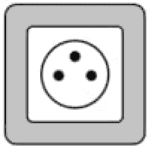Plug For Republic of the Congo: What You Need To Know
What is the plug for Republic of the Congo? Before you travel, check the information below to make sure your electronic devices are compatible with the outlet type and voltage.
Electrical Summary
Plug Compatibility: Type C, Type E
Voltage: 230V
Frequency: 50 Hz
Type C

Type D

Type E

Can North Americans use Electronics in Republic of the Congo without an Adapter?
No! North Americans will need an adapter for the outlets and a transformer for the voltage when traveling to Republic of the Congo. North Americans device plugs will not work with the outlet types in Republic of the Congo. Also, the voltage in Republic of the Congo is different from North American voltages.
Can Europeans use Electronics in Republic of the Congo without an adapter?
Yes! Europeans do not need a travel adapter or transformer when traveling to Republic of the Congo. Most device plugs will work with the outlet types in Republic of the Congo. Also, the voltage in Republic of the Congo is the same as in Europe.
What Outlet does Republic of the Congo Use?
Type C

Type D

Type C plug sockets are used in Europe, Africa and Asia. They have two round pins and no grounding pin. These plugs are typically used with devices that have a voltage of 220-240V. Plug Type E, and Type F are compatible with this socket. All other plug types will need an adapter.
Type D plug sockets are used in India, Sri Lanka, and Nepal. They have three round pins and a grounding pin. These plugs are typically used with devices that have a voltage of 230V.
Type E

Type E plug sockets are used in France, Belgium, Poland and some parts of Africa. They have two round pins and a grounding pin. These plugs are typically used with devices that have a voltage of 230V.
Is it safe to drink water in Republic of the Congo?
To be on the safe side, you can use common precautions such as boiling tap water for at least one minute, using water purification tablets, or drinking bottled water. It’s also important to note that ice may be made from tap water and that foods may be washed or prepared with tap water.
We recommend always packing a filtered water bottle when traveling:
Travel Essentials
Be sure to check our list of travel essentials before your trip!
Should I get travel insurance when traveling to Republic of the Congo?
It is generally recommended to get travel insurance when traveling to a different country. Travel insurance can provide financial protection and peace of mind in case of unexpected events, such as medical emergencies, trip cancellations, lost or stolen baggage, or other travel-related mishaps.
Travel insurance can cover various expenses related to your trip, such as medical expenses, emergency medical transportation, trip cancellation or interruption, lost or stolen baggage or personal belongings, and other travel-related expenses.
Before purchasing travel insurance, it’s important to carefully review the policy details, including the coverage limits, exclusions, and any applicable deductibles or copays. You should also make sure that the policy covers any activities or destinations that you plan to participate in or visit during your trip.
Travel Summary
The capital city of the Republic of Congo is Brazzaville, which is a bustling city with a rich cultural heritage. Visitors can explore the city’s markets, museums, and historic landmarks, including the Basilique Sainte-Anne and the Poto-Poto Cultural Centre.
The Republic of Congo is home to several national parks and wildlife reserves, which offer a chance to see a variety of African wildlife, including gorillas, chimpanzees, and rare birds. The most popular parks include the Odzala-Kokoua National Park, which is known for its lowland gorillas, forest elephants, and bongos, and the Nouabalé-Ndoki National Park, which is home to over 300 bird species and several endangered primates.
In addition to its wildlife, the Republic of Congo is known for its traditional music and dance. Visitors can attend a performance by the world-famous dancers of the Ballet National du Congo or take a lesson in traditional drumming.
The Republic of Congo is also home to several historic sites, including the Royal Palace in M’bamou Island, which was once the home of the country’s legendary king, Makoko Iloko. Visitors can explore the palace and learn about the country’s history and political struggles.
Finally, the Republic of Congo is known for its cuisine, which is a mix of African and French influences. Visitors can try dishes such as Foutou, a starchy dough served with soup or sauce, and Chikwangue, a steamed cassava bread.
In summary, the Republic of Congo is a fascinating and diverse country that offers a mix of culture, history, and wildlife. Visitors can explore its cities, national parks, and historic sites, and indulge in delicious African cuisine. It is a must-visit destination for anyone interested in African culture and wildlife.
Traveling to another country? Check out our Countries page for more info.